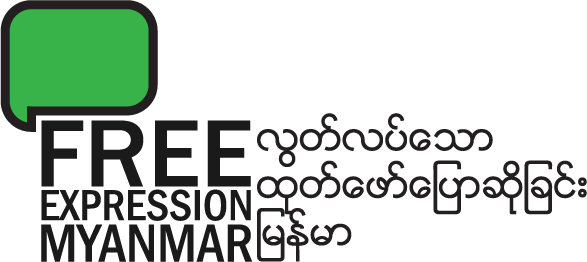Constitution — ဖွဲ့စည်းပုံ
The Constitution does not fully protect the right to freedom of expression. Articles 354 (liberty of expression and publication) and 365 (freedom of artistic expression) do not comply with international standards. There are no articles protecting media freedom and the right to information.
2017 update
The NLD wants to amend the Constitution but are unable to without the support of the military which is currently unlikely.
Summary of recommendations
The Constitution needs to be amended to include the right to freedom of expression, media freedom and access to information, and to remove the many limitations to these rights that are unacceptable under international law.
Articles 354 and 365
Article 354 guarantees that every citizen shall be at liberty “to express and publish freely their convictions and opinions” and “to assemble peacefully without arms and holding procession”, but only to the extent that they do not contradict laws for the protection of national security, public order, community peace and tranquillity, and public morality;
Article 365 provides for freedom of literary, cultural, and artistic expression for every citizen. However, it requires citizens to avoid any “act detrimental to national solidarity”, and to coordinate any action likely to adversely affect the interests of a national race with that group.
International standards
- The Constitution only guarantees freedom of expression when it does not contradict existing laws. Normally constitutions are above national laws, and any that contradict the constitution are unconstitutional.
- The Constitution only guarantees freedom of expression for citizens. Under international law, it should apply to everyone, including foreigners, refugees and stateless persons (like Thailand and Indonesia do).
- The constitution defines freedom of expression too narrowly and does not include all the parts guaranteed under international law.
- The constitutional limitations on freedom of expression are too broad. They include vague reasons that are not acceptable under international law such as “national solidarity”, “interests” of ethnic groups, and “tranquillity”. Such vague terms can be easily abused.
- The constitutional thresholds for limiting freedom of expression such as “being detrimental” are too low for a democratic society. The government must have strong justification for limiting freedom of expression, and any actions must pass the legal test of being “necessary” and “proportionate”.
- The Constitution does not guarantee free media. International law requires that it prohibits prior censorship (like Thailand or Japan does), prohibits licensing of the print media or individual journalists (like South Korea), guarantees the independence of all media regulators (such as broadcasting councils) and public service media, protects media pluralism (like East Timor) and protects the right of journalists to protect their sources.
- The Constitution does not guarantee freedom of information. International law requires a duty for governments to proactively disclose information in the public interest, and allow people to get access to publicly held information.
- The Constitution does not guarantee freedom of peaceful assembly. International law requires a duty to facilitate and protect public assemblies and prohibit the need for prior-authorisation to hold an assembly (like East Timor for example).
Recommendations
- Start a process of broad, open and accessible public consultation on reforming the Constitution.
- Combine Articles 354 and 365 into one Article with a broad scope covering all types of expression. Include clear limitations in line with international law and add the “necessary and proportionate” test.
- Add an article guaranteeing media freedom, including independence and diversity.
- Add an article guaranteeing freedom of information.
- Add an article guaranteeing freedom of peaceful assembly.
ဖွဲ့စည်းပုံအခြေခံဥပဒေသည် လွတ်လပ်စွာထုတ်ဖော်ရေးသားပြောဆိုခွင့်ကို အပြည့်အဝ အကာကွယ် မပေးထားပါ။ ပုဒ်မ ၃၅၄ ( ထုတ်ဖော် ရေးသားပြောဆိုခြင်း နှင့် ထုတ်ဝေစာ လွတ်လပ်ခွင့်) နှင့် ပုဒ်မ ၃၆၅ (အနုပညာဆိုင်ရာ လွတ်လပ်စွာ ထုတ်ဖော်ရေးသား ပြောဆိုခြင်း) တို့သည် နိုင်ငံတကာစံနှုန်းများနှင့် ကိုက်ညီမှု ရှိမနေပေ။ သတင်းမီဒီယာလွတ်လပ်ခွင့်နှင့် သတင်းအချက် အလက် လွတ်လပ်ခွင့်အတွက် အကာကွယ်ပေးထားသော ပုဒ်မများလည်း ပါရှိမနေပါ။
၂၀၁၇ Update
NLD မှ ဖွဲ့စည်းပုံအခြေခံဥပဒေကို ပြင်ဆင်ချင်သော်လည်း စစ်တပ်၏ ပံ့ပိုးမှုမပါဘဲ ပြင်ဆင်ရန်မဖြစ်နိုင်သလို စစ်တပ်၏ ပံ့ပိုးမှု ဆိုသည်မှာလည်း လောလောဆယ် ဖြစ်နိုင်ချေနည်းပါးလျက်ရှိသည်။
အကြံပြုချက် အကျဉ်း
လွတ်လပ်စွာထုတ်ဖော်ရေးသားပြောဆိုခွင့်၊ သတင်းမီဒီယာ လွတ်လပ်ခွင့်နှင့် သတင်းအချက်အလက် လွတ်လပ်ခွင့်/ သိရှိပိုင်ခွင့် တို့ကို ထည့်သွင်းရေးဆွဲရန် နှင့် ၄င်းအခွင့်အရေးများကို ကန့်သတ်ထားသည့် နိုင်ငံတကာစံနှုန်းအရ လက်ခံ၍မဖြစ်နိုင်သော ကန့်သတ်ချက်များကို ထုတ်ပယ်ပစ်ရန်အတွက်လည်း ဖွဲ့စည်းပုံအခြေခံဥပဒေအား ပြင်ဆင်ရန်လိုအပ်နေပါသည်။
ပုဒ်မ ၃၅၄ နှင့် ပုဒ်မ ၃၆၅
နိုင်ငံသားတိုင်း “၄င်းတို့၏ထင်မြင်ယူဆချက်များကို လွတ်လပ်စွာ ထုတ်ဖော်ရန်၊ ထုတ်ဝေရန်” နှင့် “လက်နက်မပါဘဲ ငြိမ်းချမ်းစွာ စုဝေး ဆန္ဒထုတ်ဖော်ရန် ” လွတ်လပ်ခွင့်ရှိသည် ဟု ပုဒ်မ ၃၅၄ က အာမခံပေးထားသော်လည်း ယင်းသည် နိုင်ငံတော်လုံခြုံရေး၊ တည်ငြိမ်အေး ချမ်းရေး၊ လူထု တည်ငြိမ်အေးချမ်းရေး နှင့် ပြည်သူ့ကိုယ်ကျင့်တရား တို့ကိုကာကွယ်ရန် ပြဌာန်းထားသော ဥပဒေများနှင့် မဆန့်ကျင်လျှင် ဟု ဆက်လက်ဖော်ပြထားသည်။
ပုဒ်မ ၃၆၅ က နိုင်ငံသားတိုင်းအတွက် စာပေ၊ ယဉ်ကျေးမှု နှင့် အနုပညာဆိုင်ရာ ဖော်ပြချက် လွတ်လပ်ပိုင်ခွင့်ကို ထောက်ပံ့ပေးထားသည် ။ သို့သော် “အမျိုးသားစည်းလုံးညီညွတ်ရေးကို ပျက်ပြားစေမည့် မည်သည့်လုပ်ဆောင်ချက်ကိုမဆို” ရှောင်ရှားရန်နှင့် အခြားတိုင်းရင်းသား လူမျိုးတစ်စု၏ အကျိုးစီးပွားကို ထိခိုက်စေမည့် မည်သည့်လုပ်ဆောင်ချက်ကို ယင်းတိုင်းရင်းသားလူမျိုးစုနှင့် ညှိနှိုင်းဆောင်ရွက်ရန် လိုအပ်ကြောင်း ပြဆိုထားသည်။
နိုင်ငံတကာစံနှုန်းများ
၁) ဖွဲ့စည်းပုံအခြေခံဥပဒေက လက်ရှိပြဌာန်းထားသော ဥပဒေများနှင့် မဆန့်ကျင်မှသာ လွတ်လပ်စွာထုတ်ဖော်ရေးသားပြောဆိုခွင့်ကို အာမခံပေးသည်။ ပုံမှန်အားဖြင့် ဖွဲ့စည်းပုံအခြေခံဥပဒေသည် အမျိုးသားဥပဒေများ၏ အထက်တွင်ရှိပြီး ၊ ဖွဲ့စည်းပုံအခြေခံဥပဒေကို ဆန့်ကျင်သမျှသည် ဖွဲ့စည်းပုံဘောင်အတွင်း မဝင်ပါ။
၂) ဖွဲ့စည်းပုံအခြေခံဥပဒေက လွတ်လပ်စွာထုတ်ဖော်ပြောဆိုခြင်းကို အာမခံပေးရာတွင် နိုင်ငံသားအတွက်သာ ဖြစ်သည်။ နိုင်ငံတကာ ဥပဒေအောက်တွင် ယင်းသည် လူသားတိုင်းအတွက် သက်ရောက်မှုရှိပြီး၊ (ထိုင်း နှင့် အင်ဒိုနီးရှားနိုင်ငံများတွင် ပြုလုပ်သကဲ့သို့) နိုင်ငံခြားသားများ၊ ဒုက္ခသည်များ နှင့် နိုင်ငံမဲ့လူသားများပါ အပါအဝင်ဖြစ်သည်။
၃) ဖွဲ့စည်းပုံက လွတ်လပ်စွာထုတ်ဖော်ရေးသားပြောဆိုခြင်းအား သတ်မှတ်ရာတွင် အလွန်အမင်း ကျဉ်းမြောင်းလွန်းပြီး၊ နိုင်ငံတကာ ဥပဒေက အာမခံချက်ပေးထားသော အစိတ်အပိုင်းအားလုံးကို ထည့်သွင်းထားခြင်း မရှိပါ။
၄) ဖွဲ့စည်းပုံအခြေခံဥပဒေက ပြဌာန်းထားသော လွတ်လပ်စွာထုတ်ဖော်ရေးသားပြောဆိုခြင်းအား ကန့်သတ်သည့် ကန့်သတ်ချက်များမှာ အလွန်အမင်း ကျယ်ပြန့်လွန်းသည်။ ယင်းတွင် “အမျိုးသားစည်းလုံးညီညွတ်ရေး”၊ တိုင်းရင်းသားလူမျိုးအုပ်စုများ၏ “အကျိုးစီးပွား” နှင့် “တည်ငြိမ်အေးချမ်းရေး” စသည့် နိုင်ငံတကာဥပဒေအရ လက်ခံနိုင်စရာ မရှိသော ဝေဝါးသည့် အကြောင်းပြချက်များလည်း ပါဝင်သည်။ ယင်းကဲ့သို့ ဝေဝါးသည့် အသုံးအနှုန်းများမှာ လွယ်ကူစွာပင် အလွဲသုံးစားပြုခြင်း ခံရနိုင်သည်။
၅) “ထိခိုက်ပျက်ပြားစေခြင်း” စသည့် လွတ်လပ်စွာရေးသားထုတ်ဖော်ခွင့်အား ကန့်သတ်ထားသည့် ဖွဲ့စည်းပုံဆိုင်ရာ အစိတ်အပိုင်းများ သည် ဒီမိုကရေစီ လူ့အဖွဲ့အစည်းအတွက် အလွန်အမင်း နိမ့်လွန်းသည်။ လွတ်လပ်စွာထုတ်ဖော်ပြောဆိုခွင့်အား ကန့်သတ်ရာတွင် ခိုင်မာ သော ဆင်ခြင်နှိုင်းဆဆန်းစစ်ချက်များ အစိုးရတွင် ရှိရမည်ဖြစ်ပြီး၊ မည်သည့် လုပ်ဆောင်ချက်မဆို ယင်း ဥပဒေဆိုင်ရာ ဆန်းစစ်ချက် ဖြစ်သော “လိုအပ်ချက်” နှင့် “အချိုးအစားညီမျှမှု” ကို ဖြတ်သန်း စစ်ဆေးခံရမည် ဖြစ်သည်။
၆) ဖွဲ့စည်းပုံသည် မီဒီယာလွတ်လပ်ခွင့်ကို အာမခံ မပေးထားချေ။ နိုင်ငံတကာဥပဒေက ကြိုတင်ဆင်ဆာစိစစ်ခြင်း (ထိုင်းနှင့် ဂျပန်မှာ ကဲ့သို့)၊ ဂျာနယ်လစ်များနှင့် ပုံနှိပ်မီဒီယာ လိုင်စင်တောင်းခံရခြင်း (တောင်ကိုရီးယားကဲ့သို့) တို့ကို တားမြစ်ရန်လိုအပ်ကြောင်း ပြဌာန်း ထားပြီး မီဒီယာစည်းကမ်းထိန်းသိမ်းရေး (ရုပ်သံလွှင့်ကောင်စီ စသော) အဖွဲ့အစည်းများအားလုံး နှင့် ပြည်သူ့ဝန်ဆောင်မှု မီဒီယာ တို့၏ လွတ်လပ်အမှီအခိုကင်းမှုကို အာမခံပေးရန် လိုအပ်ကြောင်းလည်း ပြဌာန်းထားသည်။ ထို့အပြင် မီဒီယာဗဟုဝါဒ နှင့် သတင်းရင်းမြစ်ကို ကာကွယ်ရန် ဂျာနယ်လစ်များ ၏ အခွင့်အရေးအား အကာကွယ်ပေးရန် လိုအပ်ကြောင်းကိုလည်း ပြဆိုထားသည်။
၇) ဖွဲ့စည်းပုံသည် သတင်းလွတ်လပ်ခွင့်ကို အာမခံ မပေးထားပါ။ ပြည်သူ့အကျိုးစီးပွားဆိုင်ရာ သတင်းအချက်အလက်များကို တက်ကြွစွာ ထုတ်ဖော် ပြန်ကြားပေးရန် နှင့် လူထုအား သတင်းအချက်အလက်များ ပွင့်လင်းစွာ ပိုင်ဆိုင်နိုင်အောင် ခွင့်ပြုပေးရန် စသည့် အစိုးရ၏ တာဝန်တစ်ရပ် လိုအပ်ကြောင်း နိုင်ငံတကာဥပဒေက ပြဌာန်းထားသည်။
၈) ဖွဲ့စည်းပုံသည် ငြိမ်းချမ်းလွတ်လပ်စွာစုဝေးခွင့်အား အာမခံချက် မပေးထားပါ။ လူထု၏စုဝေးခွင့်အား အဆင်ပြေချော့မွေ့အောင် အကူညီပေးရန်နှင့် အကာကွယ်ပေးရန် ၊ (ဥပမာ-အရှေ့တီမောကဲ့သို့) စုဝေးပွဲတစ်ခု ပြုလုပ်ရန် ကြိုတင်ခွင့်ပြုချက်ရယူရခြင်းလိုအပ်ချက်ကို တားမြစ်ရန် တာဝန်တစ်ရပ်ကိုလည်း လိုအပ်ကြောင်း နိုင်ငံတကာဥပဒေက ပြဌာန်းထားသည်။
အကြံပြုချက်များ
၁) ဖွဲ့စည်းပုံအခြေခံဥပဒေပြင်ဆင်ရာတွင် ကျယ်ပြန့်၊ ပွင့်လင်းပြီး လူထုပါဝင်နိုင်သော ဆွေးနွေးညှိနှိုင်းမှု ဖြစ်စဉ်တစ်ခုဖြင့် စတင်ပါ။
၂) လွတ်လပ်စွာထုတ်ဖော်ပြောဆိုရေးသားခြင်းအမျိုးအစားအားလုံးကို ခြံုငုံနိုင်မည့် ကျယ်ပြန့်သော နယ်ပယ်တစ်ခုနှင့်အတူ ပုဒ်မ ၃၅၄ နှင့် ၃၆၅ ကို ပုဒ်မ တစ်ခုတည်းအဖြစ် ပေါင်းစည်းပါ။ နိုင်ငံတကာ စံနှုန်းနှင့် အညီ ရှင်းလင်းပြတ်သားသော ကန့်သတ်ချက်များကို ထည့်သွင်းပြီး “လိုအပ်ချက်” နှင့် “အချိုးအစားညီမျှမှု” ဆန်းစစ်ချက်ကို ထည့်သွင်းရေးဆွဲပါ။
၃) လွတ်လပ်အမှီအခိုကင်းမှုနှင့် မတူကွဲပြားမှု ပါဝင်သော မီဒီယာလွတ်လပ်ခွင့်ကို အာမခံချက်ပေးသည့် ပုဒ်မတစ်ခုကို ထည့်သွင်းရေး ဆွဲပါ။
၄) သတင်းလွတ်လပ်ခွင့်/ သိရှိပိုင်ခွင့် အား အာမခံချက်ပေးသည့် ပုဒ်မတစ်ခု ထည့်သွင်းရေးဆွဲပါ။
၅) လွတ်လပ်ငြိမ်းချမ်းစွာစုဝေးခြင်း အား အာမခံချက်ပေးသည့် ပုဒ်မတစ်ခု ထည့်သွင်းရေးဆွဲပါ။
